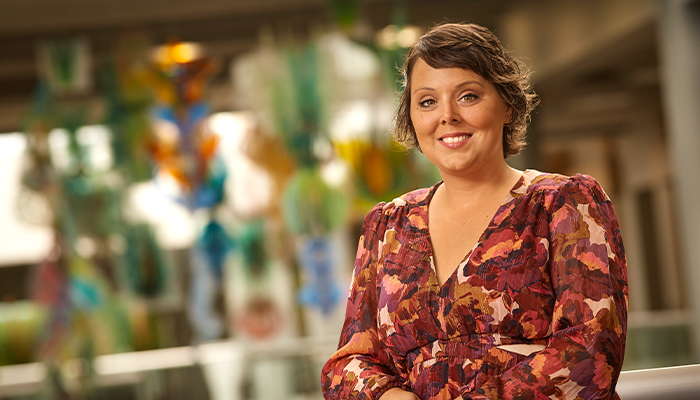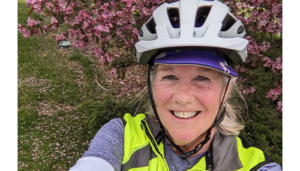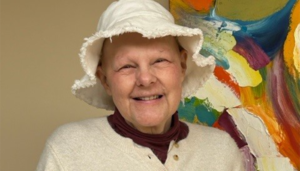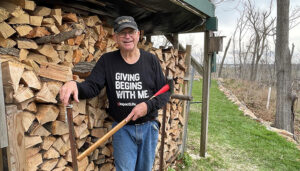Early last year, Jennifer Lundin of Atkins, was coming off two years of nursing her son and kept getting mastitis, which is an inflammation of breast tissue that sometimes causes an infection. It’s common in breastfeeding women, and Lundin’s doctor would prescribe antibiotics, which would help with the symptoms temporarily, until one day Lundin noticed a change.
“I woke up one day and felt a lump,” shared Lundin. “I was also having some breast pain. I noticed the lump was getting quite large and on June 7 I noticed some dimpling under my breast.”
Lundin’s primary care provider referred her for a mammogram. Lundin went to St. Luke’s Breast and Bone Health where she had a mammogram, ultrasound and biopsy over the course of seven or eight hours all on the same day. After the testing was complete, her suspicion was confirmed. Lundin, just 35-years-old at the time, had stage 3B breast cancer that had spread to her lymph nodes.
Hear From Our Experts
PODCAST EPISODE: 277
Therese Michels, manager of St. Luke’s Breast and Bone Health, joins Dr. Arnold to dispel some common myths about mammograms and breast cancer screening.
Coordinated Care at the Nassif Community Cancer Center
During Lundin’s long day of testing at St. Luke’s Breast and Bone Health, one person was with her through it all — Mona Cook, BSN, RN, CBCN, breast cancer care coordinator at the Nassif Community Cancer Center. A care coordinator is a patient’s constant point of contact throughout the cancer journey, from diagnosis through treatment and beyond.
Once the diagnosis was confirmed, Cook sat down with Lundin and walked through all the information she would need to know.
“I thank Mona,” said Lundin. “Because in that moment, I wasn’t alone. I had her there to walk me through the process. She also set up everything with my surgeons and oncologist.”
Exceptional Care Makes You Feel Like You Matter
Before she could have surgery, Lundin needed chemotherapy to shrink her tumor. She saw Rasa Buntinas, MD, oncologist at Physicians’ Clinic of Iowa Hematology and Oncology, who recommended 18 rounds of chemo.
“Dr. Buntinas provides exceptional care,” said Lundin. “She’s always been able to answer my questions and put my mind at ease. And her team in the infusion room — everyone was so empathetic. They’d welcome me with a hug and sit down and talk with me. I couldn’t have made it through all of that without them.”
In December, after chemotherapy shrank the cancer, Lundin had her surgery performed by Kerri Nowell, MD, surgeon at Physicians’ Clinic of Iowa.
“I didn’t feel like just another patient,” shared Lundin. “I felt like she genuinely cared, and she blew me away with her bedside manner.”
Following surgery was 28 sessions of radiation treatment with Nick Loudas, MD, and the team at St. Luke’s Nassif Radiation Center.
“They were amazing,” said Lundin. “The first day I didn’t know what to expect. They explained everything and radiation was by far the easiest part of my treatment. I give kudos to the team for that. You walk in there every day, and they smile and call you by name. You feel like you matter.”
Support Services to Compliment Treatment
The team at the Nassif Community Cancer Center is committed to treating the entire person, not just the cancer. The center offers support services ranging from nutrition and social work to exercise and integrative wellness programs. Lundin was able to use just about every support service and appreciates how they continue when treatment is over.
“The dietitians answered a lot of my questions early on about my diet, and the social workers always check in. Even now that I’m out of active treatment, they still reach out to see how I’m doing,” shared Lundin. “And Matt [Schmitz, cancer exercise specialist] has been wonderful. Any time you need to see him he makes time for you.”
Advocate for Yourself
As a young cancer patient, Lundin is passionate about sharing her story because she wants others to know breast cancer can happen to women under 40, and that these women should advocate for themselves if they have symptoms or concerns.
“For younger women, there’s a common theme and it’s, ‘You’re too young for breast cancer,’” she said. “I keep hearing the same story from women I’ve connected with and if I can tell them anything, it’s to advocate for yourself, because no one else can do that for you. There’s no harm in getting a test to put your mind at ease.”
Facing a Cancer Diagnosis?
If you’ve been diagnosed with breast cancer, or any type of cancer, the Nassif Community Cancer is here for you. For more information on our extensive offering of support services, call (319) 558-4876 or visit communitycancercenter.org
Get Your Annual Screening Mammogram
It’s recommended women start with a baseline mammogram between the ages of 35-40, then begin annual screening mammograms at age 40, or sooner if there’s a family history of breast cancer. To schedule your mammogram, talk to your healthcare provider or call (319) 369-7216 to schedule your mammogram at one of St. Luke’s Breast and Bone Health’s three convenient locations. St. Luke’s Breast and Bone Health also offers walk-in mammograms Monday through Friday from 9 a.m. – 3 p.m., with a doctor’s order.







